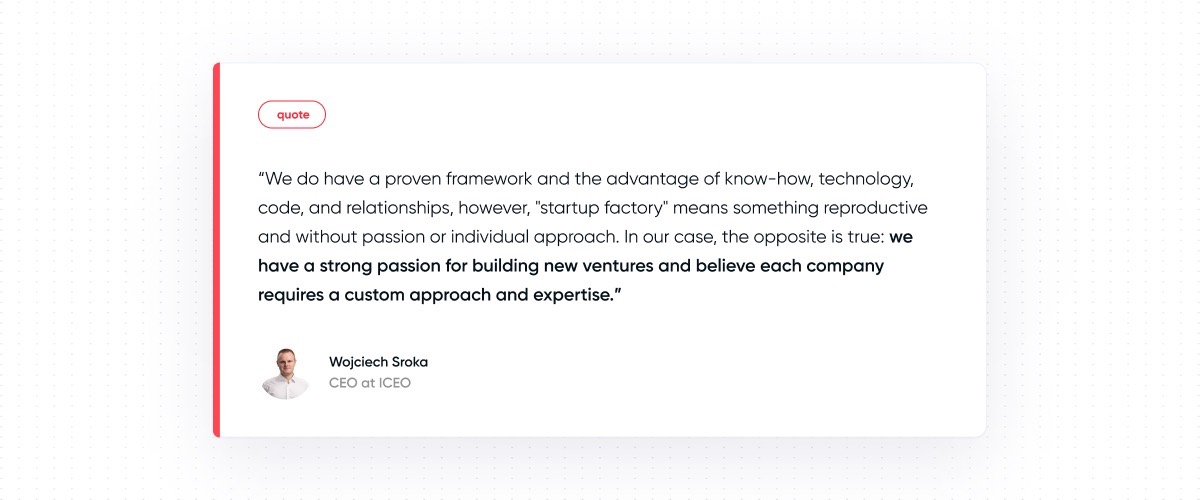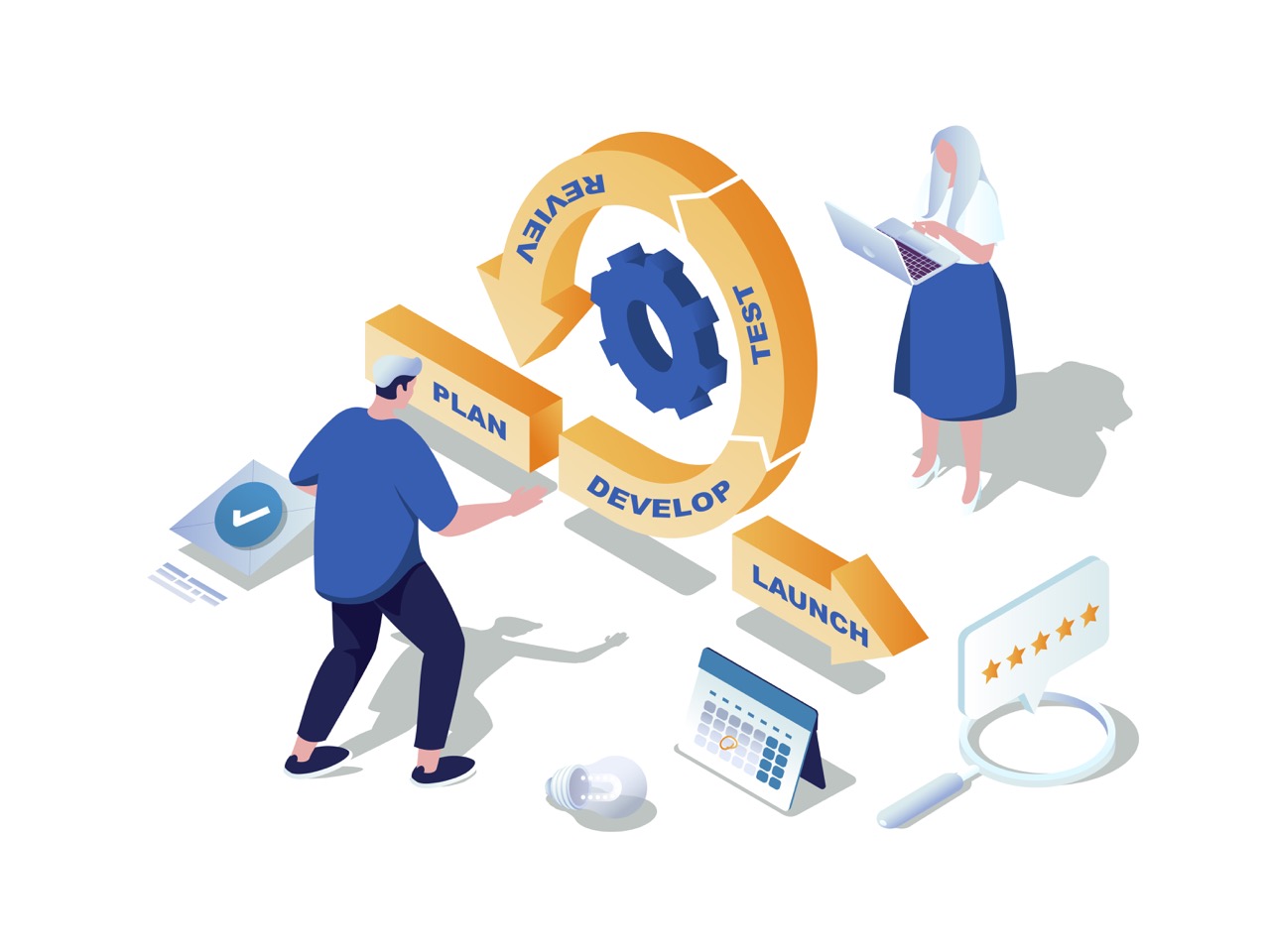Explaining Venture Building: what it is, what it is not, and what stages of building companies it covers
Karolina Kondrak
6 min of reading
Understanding Venture Building
In a nutshell, Venture Building means building businesses, and the term is mainly used to describe companies whose job is to bring other companies to life. In today's market, you'll find many approaches to turning business concepts into operating, autonomous startups. What sets Venture Building apart against this background, and what exactly does it entail? We'll discuss that in a moment.
Venture Building, Incubators, Accelerators and Venture Capital – how do they differ
There are multiple pathways to bring ideas to fruition and propel them towards success. Among these pathways, venture building, incubators, accelerators, and venture capital play distinctive roles.
By examining and contrasting these methodologies, we can gain a greater clarity of what Venture Building stands for.
-
Incubators: Nurturing Ideas in Early Stages
Incubators serve as supportive environments for startups in their early stages. They offer resources, mentorship, infrastructure, and networking opportunities to help entrepreneurs refine their ideas, develop business models, and validate their markets. Incubators typically provide a fixed-term program, enabling startups to grow and mature before moving into the market independently.
-
Accelerators: Catalyzing Growth and Expansion
Accelerators focus on accelerating the growth and expansion of existing startups. They provide intense, time-limited programs that offer mentorship, access to networks, funding opportunities, and specialized resources. Accelerators aim to help startups rapidly scale their operations, refine their strategies, and access new markets, enabling them to achieve milestones and attract further investment.
-
Venture Capital: Fueling Growth through Investment
Venture capital (VC) plays a vital role in financing and supporting startups. Venture capitalists invest capital into early-stage or high-potential companies in exchange for equity. Beyond funding, VC firms often offer mentorship, industry expertise, and guidance to help startups grow. Venture capital acts as a catalyst for scaling businesses, enabling entrepreneurs to access resources and expertise needed for expansion.
-
Venture Building: From Ideation to Scaling
And finally, Venture Building. This model can be described as a holistic, most comprehensive, approach to turning business concepts into proficiently growing companies. It encompasses the entire process, i.e. everything needed to build a company from scratch until it is a completely independent entity, ready to conquer the world.
Process-wise, this means that a Venture Builder takes care of the steps from concept generation, i.e. ideation, through validation, creation, to scaling and exit. This entire journey is carried out by the "parent company," which is equipped with its own multidisciplinary team, resources in the form of know-how, experience, networks, as well as technological facilities, code, documentation and other key elements.
With such facilities, the distance between points A and Z can be bridged more efficiently and quickly. It's also a way to reduce risk and increase the chances of success. There is another big benefit from such an approach: if a single project fails, it is easier to drop it, without suffering a sense of failure, wasted resources, or trembling over the loss of a job (employees). Well, the entire team, doumentation or developed methods will remain within the Venture Building company, can be efficiently transferred to other ventures and immediately work on the success of other projects.

Is Venture Building a startup factory?
The simple answer is no. But how is it different?
Wojciech Sroka, our CEO, sums it up as follows: “On the one hand, we have a proven framework and have the advantage of know-how, technology, code, relationships and a number of other things that are the result of previous projects. This does indeed often speed up the process and make it somewhat "mechanical". However, "factory" here means something reproductive and without passion or individual approach. And in our case, the opposite is true. We are a team of entrepreneurs with a strong passion for building new businesses. Each company requires a custom approach and expertise. Normally we work with a dozen or so projects, leading the selection to eventually focus on creating only a few of them, investing the venture builder's time and investors' money”.

The Process of Building Companies: 5 stages
At ICEO, we have meticulously crafted an effective and proven process for building successful companies. Our experience spans the entire creation process required to build companies from the ground up.
Let's have a look at the ins and outs of the process of building cutting-edge tech companies. In general overview, it is divided into 5 stages:
1. Ideation: Harvesting and Defining This stage involves generating and refining innovative ideas. We search for macro and micro trends, explore emerging industries and conduct deep scope reasearch. This allows us to generate a wide range of innovative ideas. We then carefully evaluate and select the most promising concepts, market gaps, consumer needs, considering their market potential and feasibility. This is the stage for business brief creation and initial talks with customers as well as for validation planning.
👉 At ICEO, our focus is firmly set on the realms of high-tech, including Big Data, Web3, and fintech. We are always eager to push boundaries and explore new opportunities within our acquired competencies and skill set. Our expertise in these cutting-edge domains empowers us to stay ahead of the curve while continuously seeking new avenues to leverage our experience and drive transformative ventures.
2. Verification: Learning & Verifying We believe in validating ideas early on by subjecting them to rigorous market testing. At this stage we specify unique value and selling points, conduct deep customer research and select beachhead market. We can assess the demand for the product or service, evaluate its profitability and feasibility, and ensure accountability and scalability. This thorough verification process helps us identify and address key risks, increasing the chances of success. This is also the time when we start looking for the team and a co-founder.
3. Creation: Building and Releasing First satisfied customers and product development (in an ideal scenario). Leveraging agile methodologies, we work on product development to create a Minimum Viable Product (MVP). We gather initial confirmation of product-market fit. This iterative approach allows us to gather valuable feedback and continuously refine our offering based on user insights. With a solid foundation in place, we focus on delighting our first customers and recruiting external talent.
4. Spin-out: Investing & Growing This stage is crucial for establishing a sustainable revenue stream and building a strong foundation for further development. At this point we can focus more specifically on product-market fit and growth engines, our attention turns to generating the first revenues. We develop strategies to effectively position our products in the market, ensuring they meet the needs of target customers.
5. Scale-up. Product stabilization and growth. Having achieved initial success, we shift gears towards scaling the business. We prepare for scalability by optimizing internal processes, exploring new channels and markets, and laying the groundwork for rapid expansion. Our focus is on stabilizing the product and accelerating growth, maximizing the company's potential as well as looking for exit paths.

By following this comprehensive process, ICEO has successfully built a diverse portfolio of ventures across various industries. Our dedication to refining and perfecting our venture building model ensures that founders partnering with us benefit from our extensive expertise and enjoy a higher likelihood of long-term success.
At ICEO, we are passionate about supporting founders and helping them navigate the entrepreneurial journey with confidence. Through our proven process and unwavering commitment, we strive to build exceptional companies that shape the future of their industries.
Learn more about our model here.



